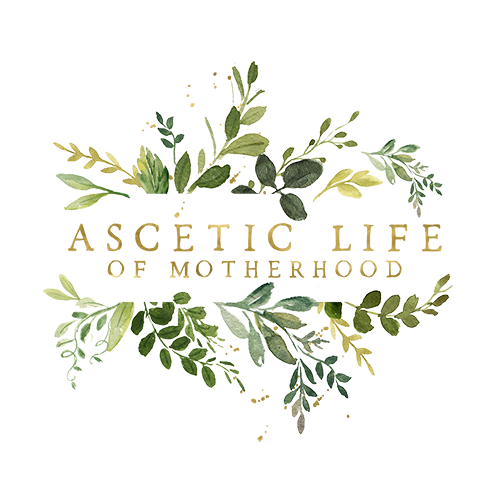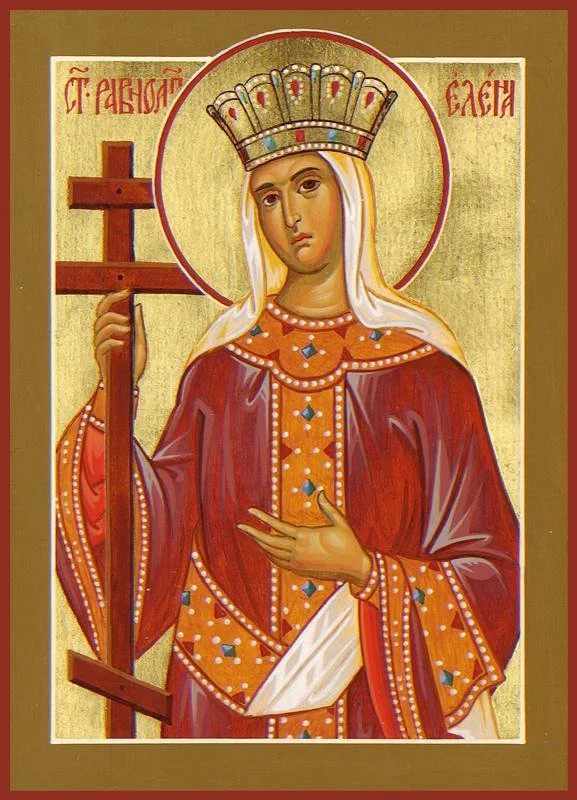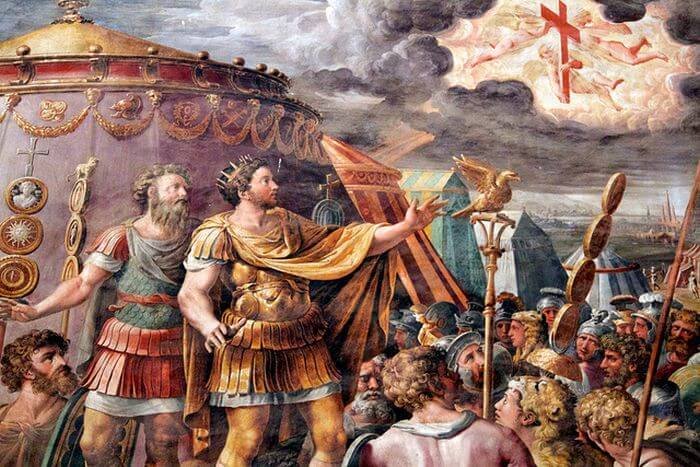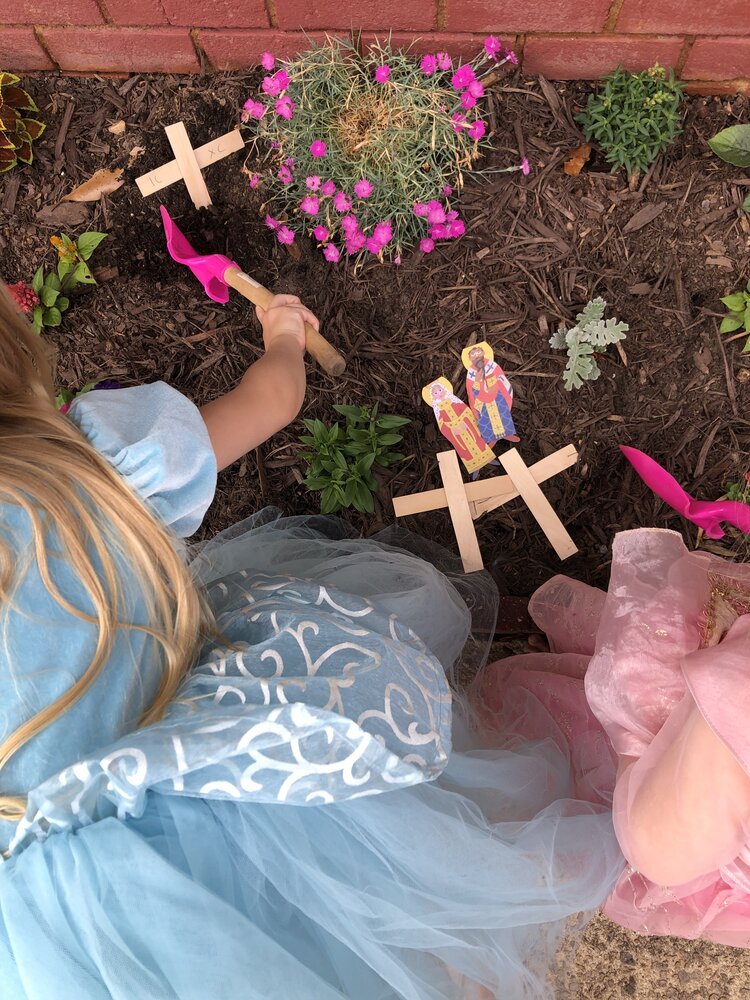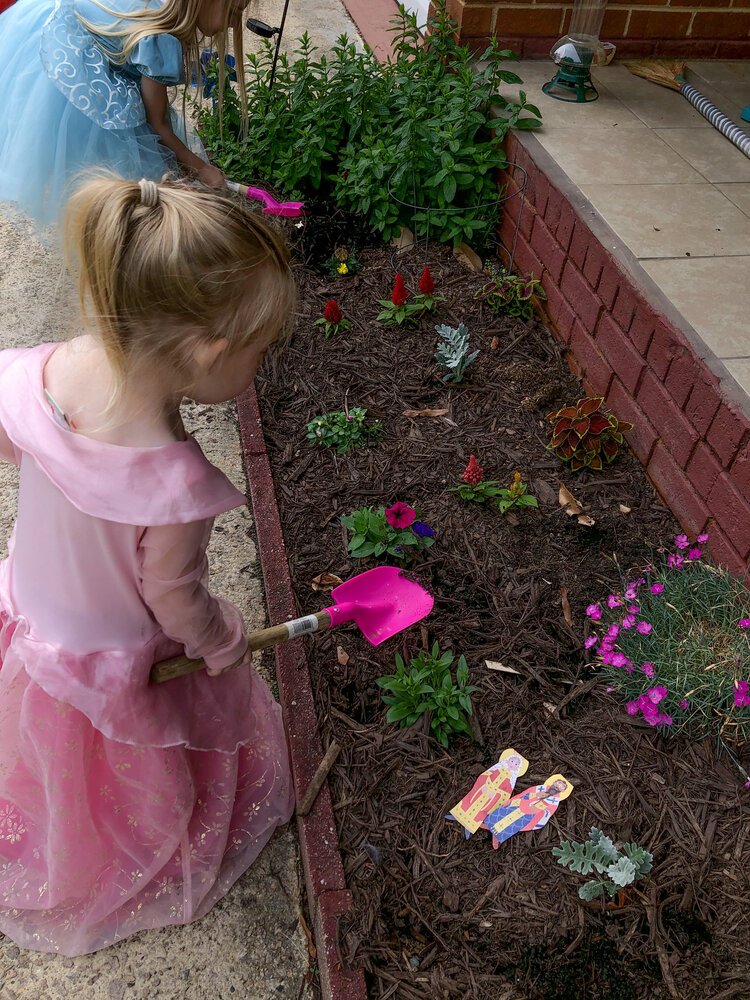Saints Constantine and Helen
Shared Feast Day May 21st
Saints Constantine and Helen - St Helen was a wise Empress who loved God with all her heart and together with her son, St Constantine, they allowed Christianity to grow and spread through the Roman Empire after a long time of persecution of Christians. They lived during the 3rd and 4th Century. St Helen is also responsible for the finding of the Holy Cross which Christ was crucified 300 years after Christ’s death. In 313, St Constantine founded Constantinople which was the capital city of the Greek Orthodox Empire until 1453. St Constantine and Helen are celebrated together on May 21st and also on Sep 14th during the Elevation of the Holy Cross. In this guide, I hope to share a little more information about these wonderful saints and I’ve included ways to participate in the feast with activity suggestions, link to a listen more about about the feast, reading suggestions and more!
St Helen icon available through Damascene Gallery
Read more about the life and Influence of Saint Helen- During a time when Christianity was illegal and Christians were persecuted, she caught the attention of the Emperor Constantius as St Helen was a beautiful, intelligent, kindhearted young woman. After the marriage of St Helen and the Emperor, she began to show him the beauty and truth of the Christian faith. Although he did not convert, what she said made sense to him and Christians were no longer persecuted in his region of the Roman Empire. Together they had Constantine, their son. St Helen and Constantius were very happy together. St Constantine grew up learning about Christ from his mother, but when Diocletian became an Emperor, it changed how the empire was ruled. After the death of his father. St Constantine became the ruler of a large part of the Roman empire. He issued a law allowing Christians to worship Christ freely.
Finding of the Holy Cross - Image Source HERE
St Helen’s search for the Holy Cross: After St Constantine made his mother Empress Augusta, he gave her access to the royal treasurey so she could travel the Holy Lands in search of the Holy Cross. All her life she longed to go to the Holy Land to venerate the places dear to every Christian: the places where Jesus taught, the places where He was born, where He taught, where He was crucified and resurrected. St Helen wanted to find the Holy Cross upon which Jesus was crucified. This was a difficult task since it had been 300 years since the crucifixion. Also, the Romans turned the crucifixion site on Golgotha into ruins. In the year 326 AD, the Empress, St Helen and the Patriarch Macarius of Jerusalem searched for the cross. They determined the likely location and the site was cleared. They noticed an unusual and aromatic herb growing all around. St Helen named it Basilico (or basil as it it now known), meaning “King” or “Royal” in Greek. Buried in the ground beneath the basil were 3 crosses. No one knew which of the crosses were the Life-Giving Cross of Jesus. So St Helen and the Patriarch prayed. There was a funeral procession passing by, so they took the women who had recently died and had her come in contact with each of the crosses. Nothing happened with the first two crosses. When he touched her with the third cross, she was healed immediately. Thus, the True Cross of Christ was identified much to the amazement of those who witnessed it. St Helen gave the Holy Cross to the Patriarch to be lifted high for all the faithful to see and venerate. In 335, on September 14th, the building of the Temple of the Resurrection began. The Patriarch once again exalted the Life-Giving-Cross for veneration. Since then, every year on September 14th we celebrate the feast of we call the Exaltation of the Holy Cross. After this, St Helen, in her zeal to glorify Christ, built churches in Jerusalem at the sites in Bethlehem at the cave where our Savior was born, another on the Mount of Olives whence He ascended into Heaven, establishing many others throughout the Holy Land, Cyprus, and elsewhere.
St Constantine seeing the sign in the sky - Image Source HERE
Read more about the life and Influence of St Constantine - St Constantine was born in 272 AD in modern day Serbia. He was the emperor of a large part of the Roman Empire. His Mother, St Helen, taught him about Christ and his commandments. When he was young, he was kidnapped and taken hostage by Galerius, the persecutor of Christians. After living in his palace for many years, one day he managed to escape and return to his homeland and his family. Years later, a man named Maxentius declared war against Rome, destroying and conquering many cities on his way to St Constantine. One the eve of battle, while St Constantine was discussing his battle plan with his generals, a sign appeared in the sky. It was a shiny cross with the inscription “In this, conquer”. In a dream later that night, Jesus appeared to him and instructed him to make a banner with a cross. With this sign, He said, he would be victorious in every battle. St Constantine gave orders for this banner to be made and the soldiers carried it to the frontline, along with their shields that they painted crosses on. They were victorious in battle against Maxentius and his army and they fled. Over time, St Constantine granted rights to the Christians who had been living in fear and danger, and now they could freely build churches and gather for liturgies and prayer and practice their faith.
Fun Fact: In 313, St Constantine founded Constantinople which was the capital city of the Greek Orthodox Empire until 1453.
Bury and Discover the True Cross Activity (See Below)
Activities:
Decorate/Adorn The Cross Supplies
Paper Puppets and Lesson on the Discovery of the Holy Cross by Orthodox Pebbles - In this FREE download, you will find printable paper puppets to recreate the story of the discovery of the Holy Cross HERE
Listen to the Song “Finding the Cross” by Gigi Baba Shadid on YouTube - in this fun song meant for children, you can learn more about St Constantine and the discovery of the Holy Cross by St Helen in a way that is fun and engaging for young children! It’s catchy and easy for kids to remember and sing along!
Bury and Discover the True Cross (See photos above) - Using 3 wooden crosses you create out of craft sticks, find a place in your yard or garden to dig and hide 3 crosses! I gave my kids the crosses to bury a few days before the feast. Then after you tell them the story, give your kids shovels or using their hands, send them out to dig up and find the crosses! Make it extra fun by adding a marking on the “true cross” so they can recreate the discovery of the cross (even using the printable paper puppets from the Orthodox pebbles materials (linked above and HERE).
Decorate/Adorn The Cross - Why not take the story of St Helen’s discovery of the cross and beautify and adorn your own cross! You can create a wooden cross using two wooden craft sticks glued together in the shape of a cross or a store bought wooden cross (places like Michael’s, Hobby Lobby or the Dollar Tree have these in the craft section). Decorate it using colored tissue paper or markers or whatever else you have on hand. You could even put real flowers and basil on top as well, and display it on your home altar to remind you of the life-giving cross!
For Older Kids:
Listen to this Youtube Video about St Constantine from the popular podcast Lord of Spirits (whole podcast is 3+ hours)
Book Recommendations:
Saint Constantine the Great “In This Conquer” Paterikon for Kids Series book by Potamitis Publishing
Saint Helen and the Finding of the Holy Cross Paterikon for Kids Series book by Potamitis Publishing
101 Orthodox Saints by Ancient Faith Publishing features Sts Helen and Constantine on page 32
My Synaxarion May: A Saint for Every Day by Potamitis Press features Sts Helen and Constantine on May 21st
My Holy Queens and Princesses by Potamitis Press features St Helen on pages 17-23
My Warrior Saints By Potamitis Publishing features St Constantine on page pg 43
Heaven Meets Earth : Celebrating Pascha and the Twelve Feasts (Elevation of the Cross page 10) by Ancient Faith Publishing
